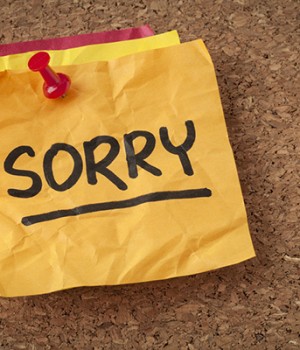When I was a little girl my mother taught me to apologise when I had done something wrong. One of the lessons she taught me was that just saying ‘sorry’ in passing or under your breath is not sufficient when you have the opportunity to offer a genuine apology.
Unfortunately, non-apologies issued by big corporations, politicians and celebrities are all too common.
It’s the business that’s ‘saddened to hear that a customer did not have their particular expectations met’ when their product caused injury.
It’s the MP who says they are sorry that not everyone at an event understood their (inappropriate, offensive, unfunny) jokes.
It’s the sports star who is ‘sorry if my actions offended anyone’ when they know their vulgar and racist comments did—understandably—offend many people.
My mumma taught me that a true apology would need to:
- Say what you are sorry for
- Acknowledge how your actions have impacted the other person(s)
- Take responsibility and ownership for what you have done and, if relevant, offer some sort of restitution (such as replacing what was broken)
Do these non-apologisers need sit down with my mother, or are there justifiable reasons for their poor apologies, such as avoiding legal implications?
To apologise or not to apologise
If your customers and stakeholders are not expecting an apology, then you probably don’t need to give one. Make sure they are treated well by you, but don’t open your business up for scrutiny that might come with an unexpected apology.
If you are responsible for a bad outcome or failing to deliver on your duty, then you should act quickly and apologise. In this case, remember the ‘Spiral of Silence’ rule: if you are silent, people will always fill that silence and it will usually be with negative implications, assumptions, previous comments, or even inaccurate assertions.
By apologising you are in a better position to take control of the situation. Consumers will be more likely to forgive a company if it speaks out, rather than remains silent.
Brands must be mindful of the balance between litigation and reputation they need in their response to issues and tragedies. However this balance needs to include being human, decent, and caring for customers. You must be genuine and sincere!
How to apologise
If an issue or tragedy has occurred and neither you nor your organisation is at fault, you can still state that you regret the situation and are saddened by it. You can contribute to making a situation right, even if you are not responsible for it, by offering support and care; customers look to you for that and expect it of you. This is a necessary element of your brand reputation as well.
Ultimately, if you are at fault and don’t offer a statement, it comes across as patronising. It is literally a non-apology. Don’t try to make light of the situation or act like your actions have had little impact, for example, don’t offer ‘we are sorry if some customers experienced slight delays’ if a large number of customers experienced significant delays that had a big impact on them.
Some circumstances call for more than just a short written statement. If your business is at fault or a tragedy has occurred, connect with your stakeholders, show that you care, put a face to your brand. One way to do this is to have an apology and a statement given by a spokesperson on video, and have that person answer questions.
Beyond ‘sorry’
If your business is at fault, for example during a product recall or when you didn’t deliver all you promised, an apology is not enough. Here’s where the offer of restitution comes in.
Set up communication channels with your stakeholders to respond to concerns; this might involve setting up a team to answer questions on the phone and via email, and sharing information on social media and your website. Provide updates and, when resolved, give assurances of what has changed. This process must give stakeholders an opportunity to trust or at least respect your brand again.
Bottom line: As an organisation, seek to do the right thing. Be human and don’t ignore your stakeholders or behave indifferently to them—after all, their continued custom is what keeps your business going.
Phoebe Netto is the Managing Director of Good Business Consulting, a boutique agency specialising in public relations, marketing and business advice for small and medium sized business. She brings big business experience to small businesses that think big.







![Strategic Alliances with Simone Novello [FREE INFOGRAPHIC]](https://anthillonline.com/wp-content/uploads/2015/08/Capture6-300x194.jpg)

![Want more credibility and influence? Unlock the 12 principles of persuasion checklist [FREE DOWNLOAD]](https://anthillonline.com/wp-content/uploads/2016/03/james-persuasion-and-influence-nfsu-02.pdf-Box-2016-03-24-15-09-44-100x75.png)
![Three easy wins when using LinkedIn with David Hobson [FREE REPORT]](https://anthillonline.com/wp-content/uploads/2015/08/3quick-wins-100x75.png)
![The Gaddie Pitch in three simple sentences with Antony Gaddie and James Tuckerman [CHEAT SHEET]](https://anthillonline.com/wp-content/uploads/2015/08/GADDIE-PITCH-updated-3D-cover--100x75.png)
![Five ways to manage your time by managing yourself, with Helen Ebdon [CHEAT SHEET]](https://anthillonline.com/wp-content/uploads/2015/07/ebdon-3d-cover-01--100x75.png)

![The art of creative thinking – how to get out of the box and generate ideas [VIDEO]](https://anthillonline.com/wp-content/uploads/2016/03/innovation-idea-300x350.jpg)
![This surprising truth about what motivates us is exactly what you need to get the best out of your employees [VIDEO]](https://anthillonline.com/wp-content/uploads/2015/11/motivated-employee-300x350.jpg)
![I, for one, will welcome our new robot overlords… [VIDEO]](https://anthillonline.com/wp-content/uploads/2014/08/robotswarm-300x350.jpg)
![Generating Web Traffic with Mark Middo and James Tuckerman [FREE REPORT]](https://anthillonline.com/wp-content/uploads/2015/08/Capture3-300x194.jpg)
![Seven steps to crafting the perfect email, with James Tuckerman [FREE REPORT]](https://anthillonline.com/wp-content/uploads/2015/08/7-steps-cheatsheet-3d-cover-nuova--100x75.png)
![Need cash for your startup or innovation? Here’s the Ultimate Grant Guide for Innovators and Startups [FREE DOWNLOAD]](https://anthillonline.com/wp-content/uploads/2015/10/INNOVATORS-GRANT-GUIDE-NFSU-page-spread-100x75.png)
![Instagram for Business… in 12 steps [FREE INFOGRAPHIC]](https://anthillonline.com/wp-content/uploads/2015/08/Capture7-100x75.jpg)
![Learn how to generate more leads in one month than most competitors would in one year! [FREE REPORT]](https://anthillonline.com/wp-content/uploads/2015/08/Capture4-100x75.jpg)
![New Zealand’s Xero eyes US IPO, further disruption as subscribers increase [INFOGRAPHIC]](https://anthillonline.com/wp-content/uploads/2014/07/sruuuuujana-212x194.png)
![Ever wonder if your ‘content marketing’ is really just crap? You gotta see this! [INFOGRAPHIC]](https://anthillonline.com/wp-content/uploads/2014/08/content-100x75.jpg)
![7 Business Lessons From Game of Thrones [INFOGRAPHIC]](https://anthillonline.com/wp-content/uploads/2014/10/infographic-games-of-thrones-041-100x75.jpg)
![How to build your own Media Empire… In seven steps with Nathan Chan [INFOGRAPHIC]](https://anthillonline.com/wp-content/uploads/2014/10/Nathan-Chan-Infographic-e1413419529176-100x75.jpg)
![5 Business Lessons From Tinder [INFOGRAPHIC]](https://anthillonline.com/wp-content/uploads/2014/10/Tinder-Elegant-Infographic-100x75.jpg)



